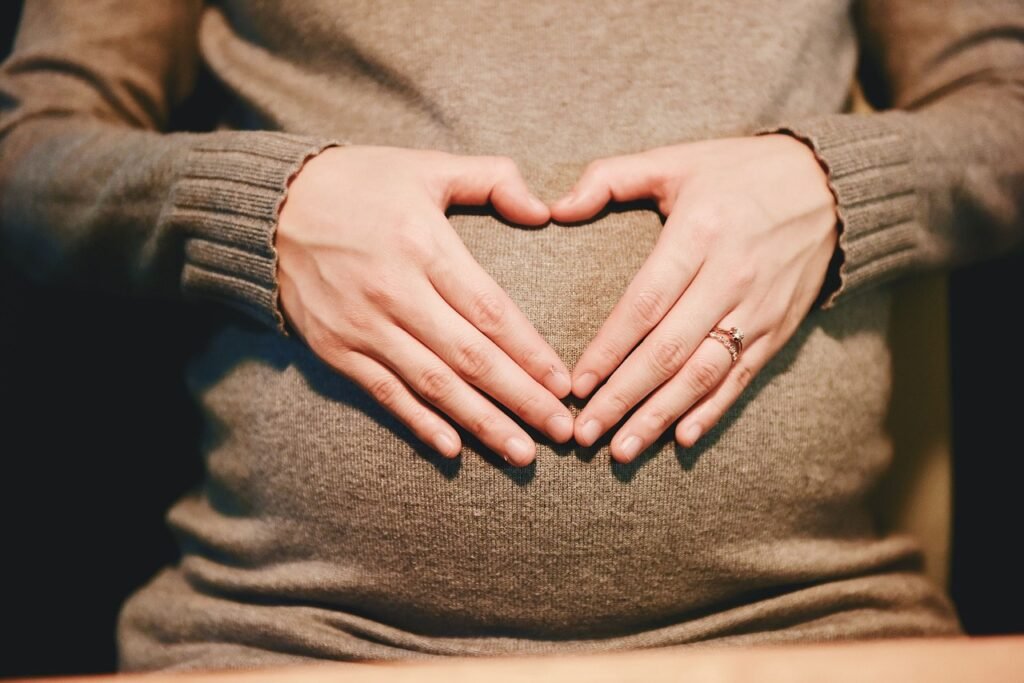Pregnancy brings big changes to your body, and these changes don’t stop after you give birth. Your hormones go through ups and downs in the weeks and months after having a baby. These hormonal shifts can affect your mood, energy, and physical health as your body adjusts to not being pregnant anymore.
You might notice some changes right away, while others happen over time. Estrogen and progesterone levels drop quickly after birth, which can lead to mood swings or feeling down. Other hormones like oxytocin and prolactin rise to help with bonding and breastfeeding. Your body is working hard to get back to its pre-pregnancy state.
Taking care of yourself after pregnancy is key. Good postpartum care includes rest, healthy food, and support from family and friends. It’s normal to feel tired or emotional as your hormones level out. If you’re worried about how you’re feeling, talk to your doctor. They can check your hormone levels and help you find ways to feel better as your body recovers.
Understanding Hormonal Fluctuations After Pregnancy
Your body goes through significant hormonal fluctuations after pregnancy. These changes affect your physical and emotional well-being as you recover and adjust to life with a new baby.
The Role of Hormones in Postpartum Recovery
Hormones play a key part in helping your body heal after childbirth. Estrogen and progesterone levels drop quickly, which can cause mood swings and physical symptoms.
Prolactin rises to support milk production. This hormone can make you feel tired and emotional. Oxytocin helps your uterus contract and promotes bonding with your baby.
Your body also produces more cortisol to help you cope with the stress of caring for a newborn. This can affect your sleep and energy levels.

Common Hormonal Fluctuations and Their Effects
In the days after giving birth, you may experience:
- Mood swings
- Night sweats
- Hair loss
- Skin changes
- Weight fluctuations
These are normal and typically improve within a few weeks or months. The drop in pregnancy hormones can sometimes lead to postpartum depression.
Your menstrual cycle may take time to return, especially if you’re breastfeeding. This is due to high prolactin levels suppressing ovulation.
Long-Term Hormonal Adjustments
Over time, your hormonal fluctuations after pregnancy will continue to change. Most women find their bodies return to a pre-pregnancy state within 6-12 months.
Some long-lasting changes may occur in your body’s hormone production. These can affect:
- Metabolism
- Bone density
- Breast tissue
If you have ongoing symptoms, talk to your doctor. They may recommend hormone therapy or other treatments to help balance your body’s chemistry.
Addressing Mental Health Concerns Post-Pregnancy
After pregnancy, your body goes through many changes. These shifts can affect your mental health. Let’s look at common issues and ways to cope.
Postpartum Depression and Anxiety
Postpartum depression affects many new mothers, which may be related to hormonal fluctuations after pregnancy. It’s more than just “baby blues.” Signs include feeling sad, hopeless, or empty for weeks. You might lose interest in things you used to enjoy. Some women have trouble bonding with their baby.
Postpartum anxiety is also common. You might worry a lot about your baby’s health or your ability to care for them. Physical symptoms can include racing heart, dizziness, and trouble sleeping.
If you notice these signs, talk to your doctor. Treatment options may include therapy, support groups, or medication. Remember, seeking help is a sign of strength, not weakness.
Coping with Mood Swings and Emotional Well-Being
Mood swings are normal after giving birth. You have hormonal fluctuations after pregnancy. Hormonal imbalance postpartum can make you feel happy one moment and tearful the next. To manage these ups and downs:
- Get enough rest when you can
- Eat a balanced diet
- Exercise gently, with your doctor’s okay
- Talk to friends or join a new parent group
Practicing self-care is key. Even small acts like taking a shower or reading a book can boost your mood. Don’t be afraid to ask for help with baby care or household tasks.
If mood swings are severe or you have thoughts of harming yourself or your baby, seek help right away. Your mental health matters, both for you and your little one.
Physical and Lifestyle Changes
After pregnancy, your body goes through many changes. These changes affect your sleep, daily routine, and nutrition. Let’s explore how your life might shift during this time.
Impact on Sleep and Energy Levels
You might feel very tired after having a baby. This fatigue is normal. Your sleep patterns will change a lot. You may wake up often to feed your baby or check on them. This can lead to less sleep overall.
Some new moms have trouble falling asleep even when they’re tired. This is called insomnia. It can happen because of stress or hormonal imbalance postpartum.
To help with sleep:
- Try to nap when your baby naps
- Ask for help with night feedings
- Create a bedtime routine
Adapting to New Routines with a Baby
Your daily schedule will change with a new baby. You’ll need to plan around feedings, diaper changes, and naps. This can be hard at first, but you’ll get used to it.
Tips for new routines:
- Be flexible
- Set small, achievable goals each day
- Use a baby carrier for hands-free time
If you’re breastfeeding, your schedule will revolve around feeding times. This is normal and will get easier with time.
Nutritional Needs and Weight Management
Your body needs good food after pregnancy. Eat lots of fruits, veggies, and whole grains. If you’re breastfeeding, you’ll need extra calories.
Some foods that are good for new moms:
- Lean proteins
- Healthy fats like avocados and nuts
- Iron-rich foods like spinach
Weight changes are common after having a baby. Don’t rush to lose weight. Focus on eating well and moving your body when you feel ready.
Watch out for signs of nutrient deficiencies. If you feel very tired or weak, talk to your doctor. They can check if you need more iron or other vitamins.
Navigating Fertility and Hormonal Imbalance Postpartum
After pregnancy, your body goes through major hormonal shifts. These changes affect your menstrual cycle, fertility, and overall health. Let’s explore how to manage these shifts and make informed choices about your reproductive health.
Restoring Menstrual Cycle and Ovulation
Your body needs time to get back to its regular cycle after giving birth. For most women, periods return within 6-8 weeks if not breastfeeding. Breastfeeding can delay this for months.
Hormone imbalances are common at first. You might notice:
- Irregular periods
- Heavier or lighter flow
- Mood swings
- Changes in cervical mucus
Ovulation usually resumes before your first postpartum period. This means you can get pregnant before your period returns. If you’re not ready for another pregnancy, use birth control even if your period hasn’t come back yet.
To track ovulation:
- Use ovulation predictor kits
- Chart your basal body temperature
- Check cervical mucus changes
Dealing with Hormonal Birth Control Decisions
Choosing birth control after pregnancy involves weighing your options carefully. These methods can affect your hormonal imbalance postpartum in different ways.
Some choices include:
- Birth control pills
- Patches
- Injections
- Implants
- Hormonal IUDs
Each option has pros and cons. Fertility monitors can help if you prefer non-hormonal methods. These track hormone changes to identify fertile days.
Talk to your doctor about:
- Your breastfeeding status
- Future pregnancy plans
- Health history
- Side effects
Remember, what worked before pregnancy might not be the best choice now. Your body and needs have changed.
Understanding Postpartum Thyroiditis and Dysfunction
Thyroid issues can pop up after pregnancy. Postpartum thyroiditis affects about 5-10% of women. It can cause mood swings, fatigue, and weight changes.
Symptoms to watch for:
- Anxiety or depression
- Hair loss
- Trouble concentrating
- Temperature sensitivity
Your doctor can check your thyroid with a simple blood test. Treatment depends on whether you have an overactive or underactive thyroid.
Most cases of postpartum thyroiditis are temporary. But some women develop long-term thyroid problems. Regular check-ups help catch and treat issues early.
If you have thyroid concerns, don’t ignore them. Proper treatment can greatly improve your quality of life and overall health.
Frequently Asked Questions
Hormonal changes after pregnancy can be complex and varied. Many new mothers have questions about what to expect and how to manage these shifts.
What are common indicators of hormonal imbalance after childbirth?
You might notice mood swings, fatigue, or changes in appetite. Postpartum depression can affect 7-15% of new mothers. Hair loss, skin changes, and irregular periods are also common signs.
Weight fluctuations and difficulty losing baby weight can indicate hormonal shifts. Some women experience hot flashes or night sweats as their body adjusts.
How long does it typically take for restoring hormonal balance post pregnancy?
Most women see their hormones start to balance within 6-8 weeks after giving birth. For some, it can take up to 6 months for levels to fully normalize.
Breastfeeding can extend the time it takes for hormones to stabilize. Your body may not return to its pre-pregnancy state until after you’ve stopped nursing.
What natural strategies can help with hormonal imbalance postpartum?
Eating a balanced diet rich in nutrients can help. Focus on whole foods, plenty of fruits and vegetables, and healthy fats.
Regular exercise, even light activities like walking, can boost mood and energy. Getting enough sleep is key, though challenging with a newborn.
Are there specific treatments recommended for postpartum hormonal imbalances?
Your doctor might suggest hormone therapy in some cases. This could include progesterone or thyroid hormone supplements if needed.
For mood-related issues, counseling or support groups can be helpful. In some cases, antidepressants may be prescribed to manage postpartum depression.
Can hormonal changes still occur several years after pregnancy, and what are the implications?
Yes, some women experience hormonal shifts for years after pregnancy. This can affect fertility, menstrual cycles, and overall well-being.
Long-term changes might include persistent thyroid issues or shifts in how your body responds to stress. Regular check-ups can help monitor these changes.
What are the potential long-term effects of hormonal imbalance postpartum?
Some women may have an increased risk of thyroid disorders or autoimmune conditions. Fibromyalgia symptoms can be influenced by hormonal imbalance postpartum.
Changes in bone density and cardiovascular health can occur. Maintaining a healthy lifestyle and regular medical care can help manage these risks.





